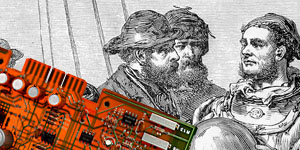


Into the Exponential
If we compress all the time since the beginning of the universe into a single year, one day corresponds to about 45 million years and one second is about 521 years. In that calendar, the earth didn't even form until the middle of September, the first life didn't show up until early in October, and the first many-celled life-form only evolved in mid-December. Then, just two days later, the first fish appeared and, two days after that, the first insects. The next day came the first amphibians; the next, the first trees; the next---Christmas Eve---the first dinosaurs.Three days later, the dinosaurs had vanished. By then their only remaining descendants, the birds, had shown up and mammals were on the rise. The primates showed up the next day. Two days later, December 31, about an hour before New Year's Day, the first protomodern humans showed up. A little over a minute to twelve, the first modern humans appeared---around thirty-five thousand years ago. At half a minute to twelve, the last ice age ended and humans scrambled out of the cave. In a few seconds they started farming and building cities.
At one second before midnight, they began printing books, having a renaissance, and making science a serious subject of study. With half a second to go, they staged an industrial revolution and then, in the last tenth of a second---in just fifty short revolutions of the planet around its sun---these hairless, two-legged, big-brained primates doubled their population, quadrupled their goods and services, tamed the atom, artificially extended their brains, reshaped their planet, jumped beyond it, and started rearranging their genes.
It's hard to think of such a panorama without feeling that it's leading up to something---something big. But, of course, as far as we know, it isn't. Fifty million years from now another species may look back and not even bother to mention us in a similar panorama. From their perspective, everything will have been leading up to them. Still, it does seem reasonable to guess that living systems will continue to get roughly more complex.
Of course, that doesn't hold everywhere and for all time. The dinosaurs, for instance, could conceivably have evolved into tool-using, space-traveling, nuclear-bomb-dropping animals just as we did. But something happened, and now they're gone. We too could soon be gone. A few million years here or there doesn't much matter to old mother earth. There's always the chimpanzees---or the dolphins---or the mice.
Yet, unless we're hit by a passing asteroid, manage to do ourselves in, or---ignominy of ignominies---unless our artificial children replace us, it seems likely that we'll continue on an upward spiral of more and yet more complexity. After all, we're still running in the same old evolutionary race.